What to Know
Health and Nutrition Tips for Fluffy Dogs
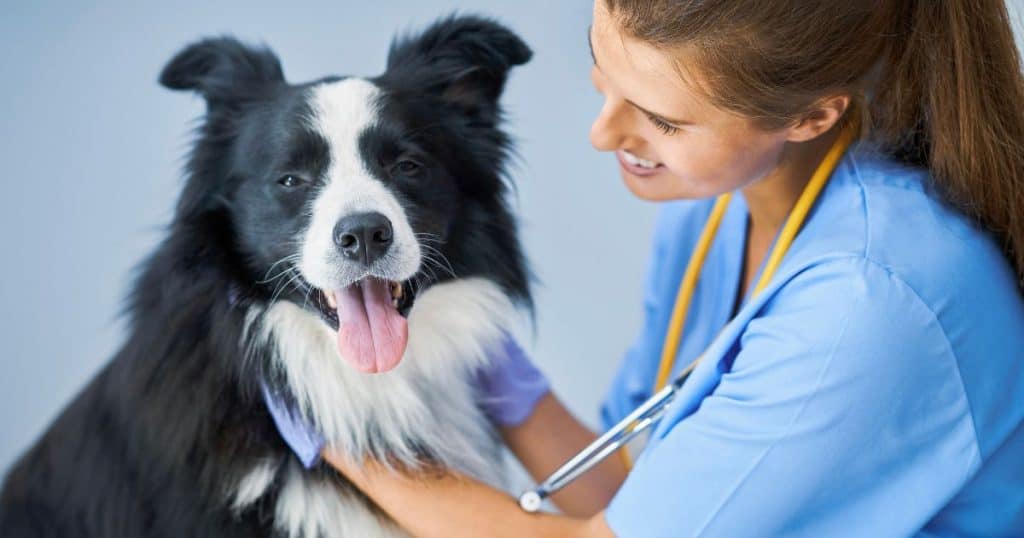
As a dog owner, you want to ensure that your furry companion is healthy and happy. One of the most important ways to achieve this is by providing your dog with a balanced diet that meets their nutritional needs. Fluffy dogs, in particular, require special attention to their diet due to their unique body structure and activity levels.
Understanding Your Dog’s Nutritional Needs
Before diving into the specifics of a healthy diet for your fluffy dog, it’s important to understand their nutritional needs. Dogs require a balanced diet that includes protein, carbohydrates, fats, vitamins, and minerals. Each of these nutrients plays a crucial role in maintaining your dog’s overall health and well-being.
Importance of Balanced Diet in Dogs
A balanced diet is essential for your dog’s health and longevity. Providing your dog with a balanced diet can help prevent health issues such as obesity, diabetes, and heart disease. A balanced diet can also improve your dog’s energy levels, coat and skin health, and immune system. In the following sections, we’ll discuss feeding guidelines for different life stages, choosing the right dog food, and understanding dog food labels, among other important topics.
Key Takeaways
- Providing your fluffy dog with a balanced diet is essential for their health and well-being.
- A balanced diet can help prevent health issues such as obesity, diabetes, and heart disease.
- Understanding your dog’s nutritional needs and feeding guidelines for different life stages are crucial for maintaining a healthy diet for your fluffy dog.
Understanding Your Dog’s Nutritional Needs
To keep your fluffy dog healthy and happy, it’s essential to understand their nutritional needs. Dogs require a balanced diet to maintain their health and wellbeing, just like humans. A balanced diet means that your furry friend is getting all the essential nutrients in the right amounts.
The six basic nutrients that your dog needs are water, proteins, fats, carbohydrates, minerals, and vitamins. These essential nutrients are required as part of your dog’s regular diet and are involved in all of the basic functions of the body.
Proteins are the building blocks of cells and tissues, and they help repair and maintain your dog’s body. Fats are a source of energy and are essential for healthy skin and coat. Carbohydrates provide energy and help maintain healthy digestion. Minerals, such as calcium and phosphorus, are essential for healthy bones and teeth. Vitamins, such as vitamin A and vitamin C, are essential for healthy immune function and overall health.
Your dog’s nutritional needs may vary depending on their age, breed, size, and activity level. Puppies, for example, require more protein and fat than adult dogs to support their growth and development. Senior dogs may require fewer calories to maintain a healthy weight.
It’s essential to choose high-quality dog food that meets your dog’s nutritional needs. Look for dog food that contains essential nutrients, such as essential fatty acids, amino acids, and vitamins. Read the ingredient list carefully and make sure that the first ingredient is a high-quality source of protein, such as chicken or beef.
In addition to providing a balanced diet, you can also supplement your dog’s diet with vitamins and minerals. However, it’s essential to consult with your veterinarian before adding any supplements to your dog’s diet.
In summary, understanding your dog’s nutritional needs is crucial to keeping them healthy and happy. Make sure to provide a balanced diet that includes all the essential nutrients in the right amounts. Consult with your veterinarian if you have any questions or concerns about your dog’s diet or nutritional needs.
Importance of Balanced Diet in Dogs

A balanced diet is essential for maintaining the overall health of your fluffy dog. Just like humans, dogs require a variety of nutrients to function properly, and these nutrients can be obtained from a balanced diet. A balanced diet can help prevent a wide range of health problems, including obesity, heart disease, and diabetes.
When it comes to feeding your fluffy dog, it is important to choose the right dog food. There are many different types of dog food available, including commercial pet foods and healthy dog food made from whole foods. It is important to choose a high-quality dog food that provides your dog with all the nutrients they need.
A balanced canine diet should include a mix of protein, carbohydrates, fats, vitamins, and minerals. Protein is essential for building and repairing tissues, while carbohydrates provide energy. Fats are important for maintaining healthy skin and coat, and vitamins and minerals are essential for overall health.
It is important to read the labels on dog food carefully to ensure that the food you are feeding your fluffy dog is nutritionally balanced. Look for dog foods that contain high-quality ingredients and avoid foods that contain fillers and artificial preservatives.
In addition to feeding your fluffy dog a balanced diet, it is also important to monitor their weight and adjust their diet as needed. Obesity is a common problem in dogs, and it can lead to a wide range of health problems. If your fluffy dog is overweight, talk to your veterinarian about developing a weight loss plan that includes a balanced diet and regular exercise.
Overall, a balanced diet is essential for maintaining the health and well-being of your fluffy dog. By choosing the right dog food and monitoring your dog’s weight, you can help prevent a wide range of health problems and ensure that your dog lives a long and healthy life.
Feeding Guidelines for Different Life Stages

When it comes to feeding your fluffy dog, it’s important to consider their life stage. Puppies have different nutritional needs than adult dogs, and senior dogs have different needs than both. Here are some general feeding guidelines for each life stage:
Puppyhood
During the first few weeks of life, puppies rely solely on their mother’s milk for nutrition. After about four weeks, they can start to be weaned onto solid food. It’s important to choose a high-quality puppy food that is specifically formulated for their nutritional needs. Puppies need more calories and protein than adult dogs to support their growth and development.
Growth Stage
Puppies go through a growth stage from about four months to one year of age. During this time, they need a lot of calories and protein to support their rapid growth. Feeding them three to four meals a day is recommended. Make sure to choose a puppy food that is appropriate for their size and breed.
Maintenance Stage
Once your dog reaches adulthood, they will need fewer calories and protein to maintain their weight and health. Most adult dogs should be fed two meals a day. It’s important to choose a high-quality dog food that is appropriate for their size and energy needs.
Senior Stage
As dogs age, their nutritional needs change. Senior dogs may need fewer calories and protein, but they still need a balanced diet that includes all the essential nutrients. It’s important to choose a senior dog food that is appropriate for their size and energy needs. Senior dogs may also benefit from supplements to support their joint health and cognitive function.
In summary, feeding your fluffy dog the right food at the right stage of life is essential for their health and well-being. Make sure to choose a high-quality dog food that is appropriate for their size, breed, and energy needs. Consult with your veterinarian if you have any questions or concerns about your dog’s diet.
Choosing the Right Dog Food
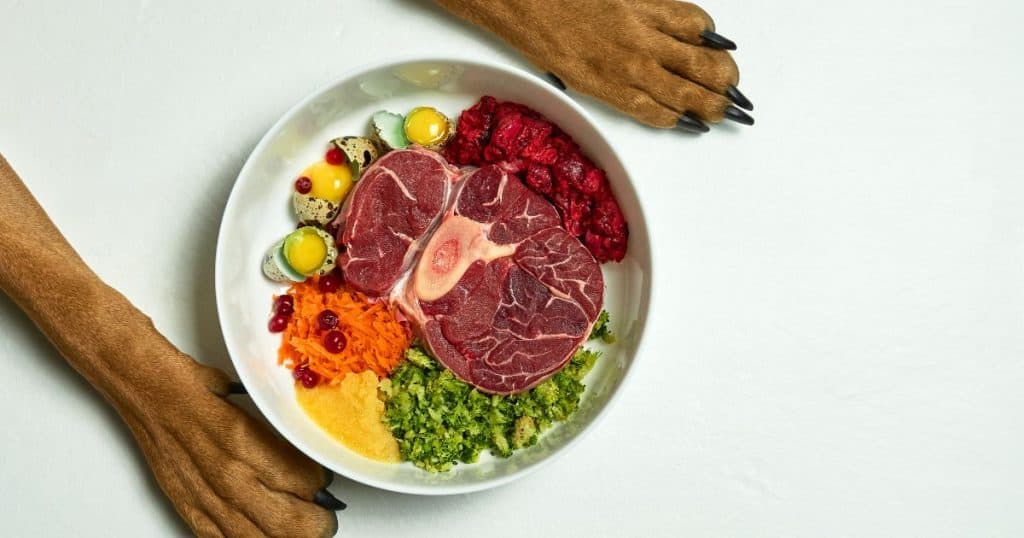
One of the most important aspects of your fluffy dog’s health is their diet. Feeding your dog a balanced and nutritious diet is essential to maintaining their overall health and wellbeing. With so many options available, choosing the right dog food can be overwhelming. In this section, we will discuss some important factors to consider when selecting the best food for your fluffy dog.
Consult with Your Vet
Before making any changes to your dog’s diet, it is important to consult with your veterinarian. They can provide you with valuable advice on the best type of food for your dog’s specific needs. Your veterinarian can also help you determine the appropriate portion sizes and feeding schedule for your dog.
Look for AAFCO Approval
When selecting a dog food, look for products that have been approved by the Association of American Feed Control Officials (AAFCO). AAFCO sets standards for pet food and ensures that products meet minimum nutritional requirements. Foods that meet AAFCO standards will have a statement on the label indicating that the product is “complete and balanced” for a specific life stage.
Consider the Ingredients
The ingredients in your dog’s food can have a significant impact on their health. Look for dog foods that list high-quality protein sources, such as chicken, beef, or fish, as the first ingredient. Avoid foods that contain fillers, such as corn or wheat, as these provide little nutritional value and can be difficult for dogs to digest.
Choose the Right Type of Food
There are several types of dog food available, including kibble, canned food, dry food, processed food, and raw food. Kibble is the most popular type of dog food and is convenient to store and serve. Canned food is a good option for dogs that need more moisture in their diet. Dry food is a good option for dogs that have dental issues. Processed food is a good option for dogs that have food sensitivities. Raw food is a good option for dogs that need a high-protein diet.
Pay Attention to Portion Sizes
Feeding your dog the appropriate portion size is essential to maintaining their health. Overfeeding your dog can lead to obesity, which can cause a variety of health problems. Follow the feeding guidelines on the dog food label and adjust the portion size based on your dog’s activity level and weight.
In conclusion, choosing the right dog food is essential to maintaining your fluffy dog’s health and wellbeing. Consult with your veterinarian, look for AAFCO approval, consider the ingredients, choose the right type of food, and pay attention to portion sizes. By following these guidelines, you can ensure that your fluffy dog is getting the nutrition they need to live a happy and healthy life.
The Role of Water in a Dog’s Diet
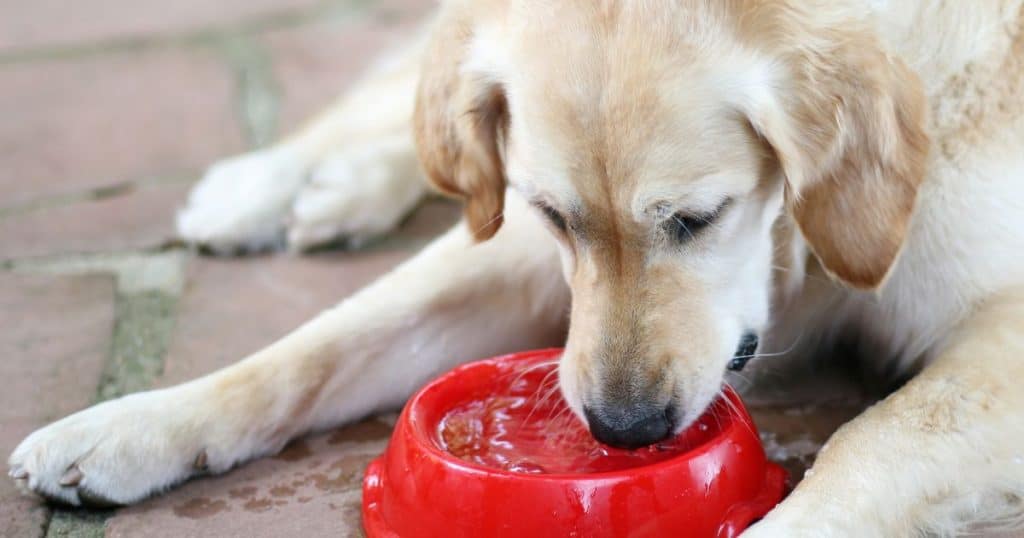
Water is an essential nutrient for all living creatures, including dogs. It plays a crucial role in your fluffy dog’s well-being and overall health. Water constitutes nearly 70-80% of a dog’s body mass, so it’s absolutely essential for a normally functioning body. A loss of only 10% of the body’s total fluids can cause serious illness. Therefore, it’s crucial to ensure that your dog has access to clean, fresh water at all times.
Absorption
Water is essential for the absorption of nutrients from food. It helps to break down food and aids in the absorption of essential nutrients, which are then transported throughout the body. Without adequate water, your dog may suffer from malnutrition, even if they are eating a balanced diet.
Urine
Water plays a crucial role in the production of urine. It helps to flush out toxins and waste products from the body. If your dog is not drinking enough water, it can lead to dehydration, which can result in a buildup of toxins in the body. This can cause a range of health problems, including kidney disease and urinary tract infections.
Bowel Movements
Water is also essential for maintaining healthy bowel movements. It helps to keep the digestive system functioning properly, preventing constipation and other digestive issues. Adequate water intake can also help to prevent the formation of urinary stones and other digestive problems.
In summary, water is a vital nutrient for your fluffy dog’s health and well-being. It plays a crucial role in the absorption of nutrients, the production of urine, and maintaining healthy bowel movements. Therefore, it’s important to ensure that your dog has access to clean, fresh water at all times.
Understanding Dog Food Labels
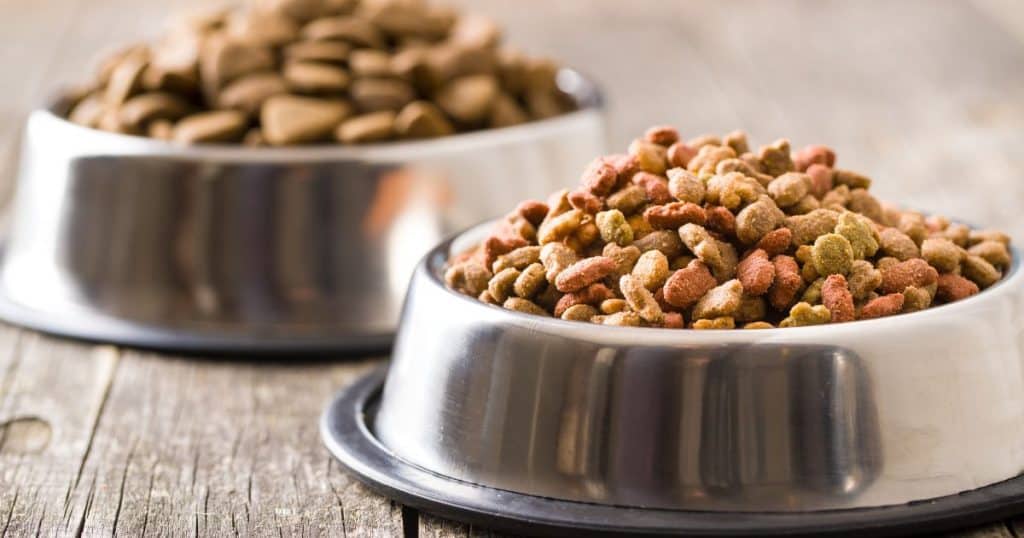
As a responsible pet owner, you want to ensure that your furry friend is getting the best possible nutrition. One of the best ways to do this is by reading and understanding dog food labels. However, with so many different brands and types of dog food available, it can be challenging to know what to look for. In this section, we will break down the essential elements of a dog food label and what they mean for your dog’s health.
Nutritional Adequacy Statement
The nutritional adequacy statement is one of the most critical parts of a dog food label. This statement indicates whether the food meets the minimum nutritional requirements established by the Association of American Feed Control Officials (AAFCO) for a specific life stage, such as adult maintenance or growth. If a food is labeled as “complete and balanced” for a particular life stage, it means that it meets or exceeds AAFCO’s standards. However, if a food is labeled as “intermittent or supplemental feeding,” it is not considered complete and balanced and should not be used as a primary food source.
Ingredient List
The ingredient list is another essential component of a dog food label. All ingredients must be listed in descending order by weight. This means that the first ingredient listed is the most significant component of the food. Look for high-quality sources of protein, such as chicken, beef, or fish, as the first ingredient. Avoid foods that list “meat by-products” or “animal digest” as the first ingredient, as these are low-quality sources of protein.
Guaranteed Analysis
The guaranteed analysis provides information about the nutrient content of the food. It lists the minimum percentages of crude protein and fat and the maximum percentages of crude fiber and moisture. While this information can be helpful, it is important to remember that it is only a minimum or maximum value. The actual nutrient content of the food may vary.
Feeding Guidelines
The feeding guidelines on a dog food label provide recommendations for how much food to feed your dog based on their weight and activity level. However, it is essential to remember that these are just guidelines. Every dog is different, and their individual needs may vary. Be sure to monitor your dog’s weight and adjust their food intake accordingly.
Other Considerations
When reading a dog food label, there are a few other things to keep in mind. For example, avoid foods that contain artificial preservatives, colors, or flavors. Look for foods that are made in the United States or Canada, as these countries have stricter regulations on pet food manufacturing. Finally, if you have any questions or concerns about a particular food, contact the manufacturer directly.
In conclusion, understanding dog food labels is crucial for ensuring that your furry friend is getting the best possible nutrition. By paying attention to the nutritional adequacy statement, ingredient list, guaranteed analysis, feeding guidelines, and other considerations, you can make an informed decision about what to feed your dog. Remember, always consult with your veterinarian before making any changes to your dog’s diet.
Homemade Dog Food: Pros and Cons
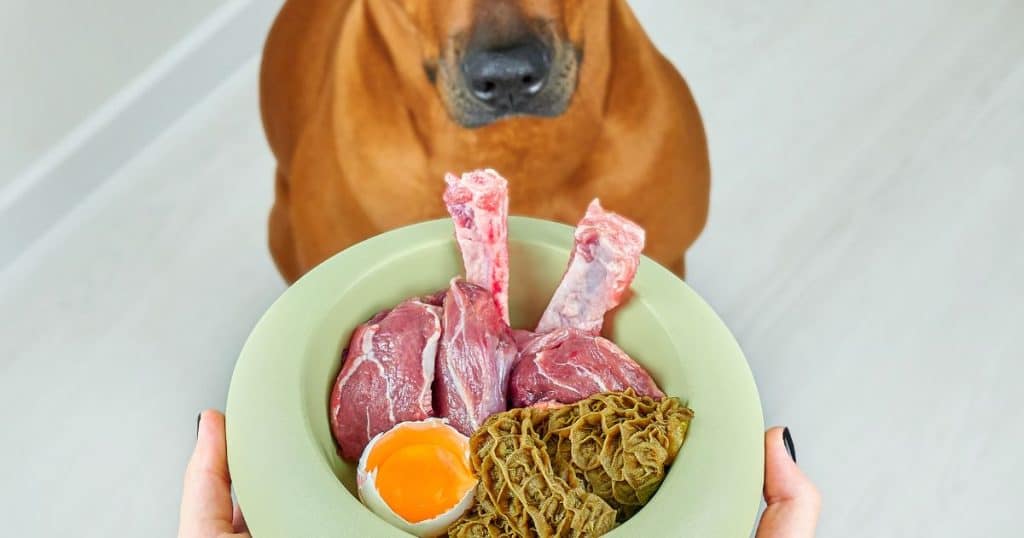
Feeding your furry friend homemade dog food is a popular trend nowadays. This is because it offers benefits like diet management, appeasing picky eaters, and bond-building. However, it also has its drawbacks. As a responsible pet owner, it is essential to weigh the pros and cons of homemade dog food before you decide to switch from commercial dog food.
Pros of Homemade Dog Food
Control over Ingredients
One of the significant benefits of homemade dog food is that you have control over the ingredients that go into your dog’s food. You can choose the best ingredients that suit your dog’s dietary needs, such as chicken, fish, vegetables, and fruits. You can also avoid ingredients that your dog is allergic to or doesn’t like.
No Additives or Preservatives
Commercial dog food often contains additives and preservatives to increase shelf life and enhance the taste. However, homemade dog food doesn’t contain any of these harmful chemicals, making it a healthier option for your furry friend.
Bond-Building
Cooking for your dog can be a bonding experience for both of you. It also shows your furry friend that you care about their health and well-being.
Cons of Homemade Dog Food
Time-Consuming
Homemade dog food requires a lot of time and effort to prepare. You need to plan and prepare the meals in advance, which can be challenging if you have a busy schedule.
Nutrient Imbalance
It is crucial to ensure that your homemade dog food contains all the necessary nutrients that your dog needs. This includes protein, carbohydrates, fats, vitamins, and minerals. If you don’t balance the nutrients correctly, your dog may suffer from nutrient deficiencies or excesses, leading to health problems.
Risk of Contamination
Homemade dog food can be contaminated if not prepared and stored correctly. For example, if you use a pan or utensils that are not clean, your dog may get sick from bacteria or other harmful substances.
In conclusion, homemade dog food has its pros and cons. As a responsible pet owner, it is essential to weigh the benefits and drawbacks of homemade dog food before deciding to switch from commercial dog food. If you decide to make homemade dog food, make sure you have the time and knowledge to prepare balanced and nutritious meals for your furry friend.
Dog Treats and Snacks: What to Know

As a loving dog owner, you want to give your furry friend treats and snacks to show them how much you care. However, it’s essential to understand what you’re feeding them and how it can affect their health. Here are some important things to know about dog treats and snacks.
Types of Treats
There are many types of dog treats available, including biscuits, chews, jerky, and rawhide. Some treats are designed to clean your dog’s teeth, while others are meant to be training rewards or just a tasty snack. When choosing treats for your dog, consider their age, size, and dietary restrictions.
Risks
While treats can be a great way to bond with your dog and reinforce positive behavior, they can also pose some risks. Some treats can be high in calories, leading to weight gain and obesity. Others may contain harmful ingredients, such as xylitol, chocolate, and raisins, which can be toxic to dogs. Always read the label and consult with your veterinarian if you have any concerns.
Sugars
Just like humans, dogs can develop a sweet tooth. However, too much sugar can lead to health problems, including obesity, dental issues, and diabetes. Look for treats with natural sweeteners, such as honey or applesauce, or consider making your own treats at home using fruits and vegetables.
Chocolate
Chocolate is toxic to dogs and can cause vomiting, diarrhea, seizures, and even death. The darker the chocolate, the more dangerous it is for your furry friend. Avoid giving your dog any chocolate treats and keep all chocolate products out of reach.
In conclusion, treats and snacks can be a fun way to show your dog how much you care, but it’s crucial to choose them carefully. Always read the label, consider your dog’s dietary needs, and consult with your veterinarian if you have any concerns. By taking these steps, you can ensure that your furry friend stays healthy and happy for years to come.
Health Risks Associated with Poor Nutrition

As a responsible pet owner, it is your duty to ensure that your furry friend receives a balanced and nutritious diet. Poor nutrition can lead to a host of health problems that can impact your dog’s overall well-being.
One of the most common health risks associated with poor nutrition is weight gain. Overfeeding your dog or feeding them a diet that is high in calories can lead to obesity. Obesity is a serious health concern for dogs and can increase their risk of developing a range of health problems, including diabetes, heart disease, and joint problems such as arthritis.
Poor nutrition can also affect your dog’s skin and coat health. A diet that is lacking in essential nutrients can cause dry, itchy skin, and a dull, lifeless coat. In some cases, poor nutrition can even lead to skin infections and other skin-related issues.
Ears, nose, and gums can also be affected by poor nutrition. A diet that is high in sugar and carbohydrates can lead to an overgrowth of plaque and bacteria in your dog’s mouth, which can cause gum disease and tooth decay. Poor nutrition can also lead to inflammation in your dog’s ears, nose, and throat, which can cause infections and other health problems.
Kidney failure is another serious health risk associated with poor nutrition. A diet that is high in protein can put a strain on your dog’s kidneys and increase their risk of developing kidney disease.
In conclusion, poor nutrition can have a significant impact on your dog’s health and well-being. As a responsible pet owner, it is important to provide your furry friend with a balanced and nutritious diet to ensure that they stay healthy and happy for years to come.
The Importance of Regular Exercise

As a responsible pet parent, one of the most important things you can do for your fluffy dog’s health is to ensure they get enough regular exercise. Exercise is essential for maintaining your dog’s physical and mental well-being, and it can help prevent a range of health problems.
Regular exercise helps to maintain your dog’s energy needs and weight. Dogs who don’t get enough exercise are at risk of becoming overweight or obese, which can lead to a range of health problems, including diabetes, bone disease, cancer, depression, dementia, chronic inflammation, and more. Exercise can also help to reverse obesity by improving metabolism, making fat management easier.
In addition to maintaining a healthy weight, regular exercise helps to keep your dog’s muscles, joints, and bones strong and healthy. Exercise can also help to improve your dog’s cardiovascular health, reducing the risk of heart disease.
Dogs who get regular exercise are also less likely to develop behavioral problems such as aggression, anxiety, and destructive behavior. Exercise provides mental stimulation, which can help prevent boredom and keep your dog’s mind engaged.
It’s important to note that the amount and type of exercise your dog needs will depend on their breed, age, and overall health. Some dogs may require more exercise than others, and certain breeds may be more suited to certain types of exercise. Consult with your veterinarian to develop an exercise plan that is appropriate for your dog.
In summary, regular exercise is essential for maintaining your fluffy dog’s physical and mental health. It helps to maintain their energy needs, weight, muscle, joint, and bone health, cardiovascular health, and can prevent behavioral problems. Consult with your veterinarian to develop an exercise plan that is appropriate for your dog’s breed, age, and overall health.
Role of Nutrition in Disease Prevention

Proper nutrition plays a vital role in disease prevention for your furry friend. Feeding your dog a well-balanced diet, rich in essential nutrients, can help to keep them healthy and reduce the risk of developing various health conditions.
One of the most significant benefits of proper nutrition is the prevention of obesity. Obesity is a common health issue among dogs that can lead to several health problems such as diabetes, heart disease, and joint problems. Feeding your dog a healthy diet, along with regular exercise, can help to maintain a healthy weight and prevent these health issues.
Nutrition also plays a crucial role in protecting your dog’s immune system. A well-nourished dog is less likely to fall ill and more capable of fighting off infections. Nutrients such as vitamins, minerals, and antioxidants are essential for maintaining a healthy immune system. Feeding your dog a diet rich in these nutrients can help to prevent infections and diseases.
Additionally, proper nutrition can help to protect your dog’s skin and coat. A diet rich in essential fatty acids can help to keep your dog’s skin healthy and prevent skin conditions such as dryness, itching, and flaking. A healthy coat not only looks good but also serves as a protective barrier against environmental pollutants and parasites.
In conclusion, proper nutrition is crucial for maintaining your dog’s health and preventing various health issues. By feeding your dog a well-balanced diet, rich in essential nutrients, you can help to protect their immune system, prevent obesity, and keep their skin and coat healthy. Remember to consult your veterinarian to determine the best diet for your furry friend’s specific needs.
Nutrition Tips for Special Health Concerns

When it comes to feeding your fluffy dog, it’s important to consider any special health concerns they may have. Here are some tips to keep in mind:
Bones and Teeth
If your dog has dental issues or is prone to chewing on bones, it’s important to choose foods that are easy to chew and won’t damage their teeth. Look for soft, moist foods or consider adding water to dry kibble to make it easier to eat. Avoid feeding your dog bones, as they can splinter and cause serious injury.
Organs
Some dogs may have health issues that affect their organs, such as liver or kidney disease. If this is the case, it’s important to choose foods that are low in protein and phosphorus, as these nutrients can be hard on the kidneys. Your veterinarian can recommend a special diet that meets your dog’s specific needs.
Stomachs
If your dog has a sensitive stomach, it’s important to choose foods that are easy to digest and won’t cause upset. Look for foods that are labeled as “limited ingredient” or “sensitive stomach” to ensure that they are gentle on your dog’s digestive system.
Mucus
If your dog has excessive mucus production, it’s important to choose foods that are low in histamines. Histamines are compounds that can trigger mucus production and inflammation. Look for foods that are free from artificial preservatives, colors, and flavors, as these can also trigger histamine production.
Digestibility
If your dog has trouble digesting certain foods, it’s important to choose foods that are easy to digest and won’t cause digestive upset. Look for foods that are high in fiber and low in fat, as these nutrients can help promote healthy digestion.
Energy Requirements
If your dog is very active or has a high metabolism, they may require more calories than other dogs. Look for foods that are high in protein and fat to help meet their energy needs. However, be careful not to overfeed your dog, as this can lead to obesity and other health issues.
By keeping these tips in mind, you can ensure that your fluffy dog gets the nutrition they need to stay healthy and happy. Remember to always consult with your veterinarian before making any changes to your dog’s diet.
Feeding Tips for Dog Owners

As a dog owner, you want to give your furry friend the best possible nutrition to keep them healthy and happy. Here are some feeding tips to help you make sure your dog is getting the nutrients they need:
What to Feed Your Dog
When it comes to feeding your dog, it’s important to choose a high-quality dog food that meets their nutritional needs. Look for a dog food that lists a high-quality protein source, such as chicken or beef, as the first ingredient. Avoid dog foods that contain fillers, such as corn or wheat, as these can be difficult for dogs to digest.
You may also want to consider feeding your dog a raw or homemade diet. However, it’s important to consult with your veterinarian before making any changes to your dog’s diet.
How Much to Feed Your Dog
The amount of food your dog needs depends on their age, weight, and activity level. Most dog food brands provide feeding guidelines on the packaging, but it’s important to adjust the amount based on your dog’s individual needs.
In general, adult dogs should be fed twice a day, while puppies may need to be fed more frequently. It’s important to measure your dog’s food to ensure they are getting the appropriate amount.
Feeding Schedule
Establishing a regular feeding schedule can help prevent overeating and obesity. Feed your dog at the same time each day, and avoid leaving food out all day.
If you have a busy schedule, consider investing in an automatic feeder that can dispense food at set times throughout the day.
Treats
Treats can be a great way to reward your dog, but it’s important to choose them wisely. Look for treats that are high in protein and low in fat, and avoid treats that contain fillers or artificial preservatives.
It’s also important to limit the amount of treats you give your dog, as too many can lead to weight gain and other health problems.
By following these feeding tips, you can help ensure that your dog is getting the nutrition they need to live a healthy and happy life.
The Role of Veterinarians in Dog Nutrition
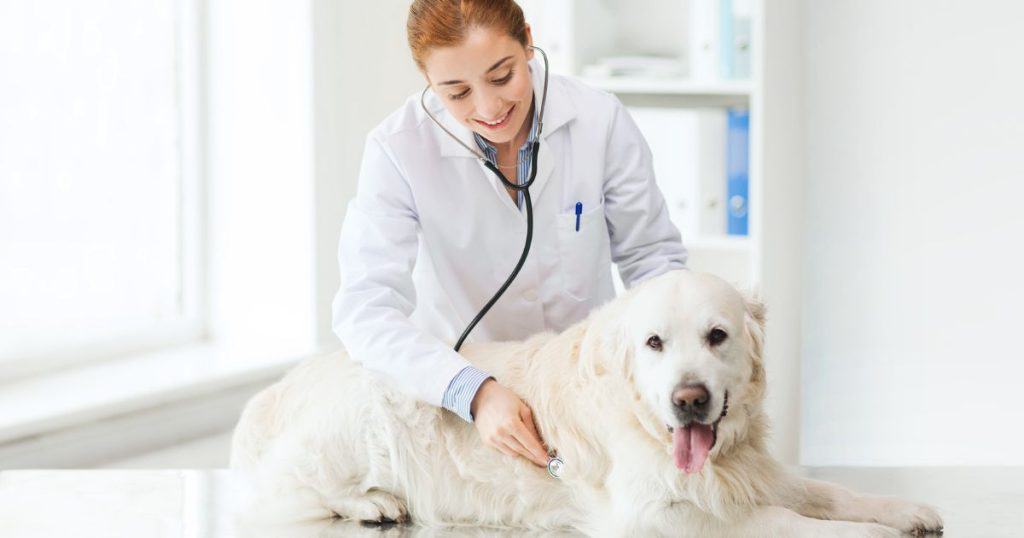
When it comes to keeping your fluffy dog healthy and well-nourished, veterinarians play a crucial role. These professionals are trained to provide expert advice on all aspects of pet care, including nutrition.
Here are some of the ways in which veterinarians can help ensure your furry friend is getting the best possible diet:
- Nutritional Assessments: A veterinarian can perform a thorough nutritional assessment of your dog to determine if they are receiving the right balance of nutrients. This assessment can help identify any deficiencies or excesses in their diet and provide recommendations for improvement.
- Dietary Recommendations: Based on the nutritional assessment, a veterinarian can provide dietary recommendations tailored to your dog’s specific needs. This might include advice on the type and amount of food to feed your dog, as well as recommendations for supplements or other nutritional aids.
- Health Monitoring: Regular check-ups with a veterinarian can help monitor your dog’s overall health, including their weight and body condition. This can help identify any potential health issues related to diet, such as obesity or malnutrition.
- Medical Intervention: In some cases, a dog’s nutritional needs may require medical intervention. Veterinarians can diagnose and treat a range of conditions related to diet, such as food allergies, kidney disease, and diabetes.
- Education: Finally, veterinarians can provide valuable education on dog nutrition, including information on feeding schedules, portion control, and the importance of a balanced diet. They can also offer guidance on how to read pet food labels and choose the best food for your dog’s needs.
In short, veterinarians play a vital role in ensuring your fluffy dog stays healthy and well-nourished. By working closely with a veterinarian, you can help ensure your furry friend gets the best possible care and nutrition.
The Importance of Fiber in a Dog’s Diet

As a responsible dog owner, you want to ensure that your furry friend is happy and healthy. One way to achieve this is by providing them with a well-balanced diet. A crucial component of this diet is fiber. Fiber is essential for maintaining your dog’s health and managing some diseases.
Fiber is a type of carbohydrate that is not digestible by your dog’s body. Instead, it passes through their digestive system, adding bulk to their stool and helping to regulate their bowel movements. It also helps to absorb water, keeping your dog hydrated and preventing constipation.
There are two types of fiber: soluble and insoluble. Soluble fiber dissolves in water and forms a gel-like substance in your dog’s digestive system. This type of fiber helps to regulate blood sugar levels, lower cholesterol, and prevent diarrhea. Insoluble fiber does not dissolve in water and adds bulk to your dog’s stool, promoting regular bowel movements.
Fiber is also beneficial for weight management. It allows your dog to feel full while consuming fewer calories, making it an excellent choice for those trying to take weight off their dogs. High-fiber dog food can help your dog maintain a healthy weight and reduce the risk of obesity-related health problems.
So, how can you ensure that your dog is getting enough fiber in their diet? Look for dog food that contains high-quality sources of fiber, such as vegetables, fruits, and whole grains. Some examples include sweet potatoes, green beans, apples, and brown rice. You can also add fiber-rich supplements to your dog’s diet, such as psyllium husk or flaxseed.
In conclusion, fiber is an essential component of your dog’s diet. It helps to regulate bowel movements, maintain a healthy weight, and prevent some diseases. By providing your dog with high-quality sources of fiber, you can help them lead a happy and healthy life.
The Benefits of Antioxidants in Dog Food

As a pet owner, you want to make sure that your furry friend is getting the best nutrition possible. One way to ensure this is by providing them with food that is rich in antioxidants. Antioxidants are substances that help protect the body from harmful molecules called free radicals, which can damage cells and contribute to the development of various diseases.
Antioxidants are essential for your dog’s overall health and wellbeing. They help support the immune system, improve cognitive function, and reduce inflammation. Antioxidants can also help prevent cancer, heart disease, and other chronic conditions.
Some of the most common antioxidants found in dog food include vitamins C and E, beta-carotene, selenium, and zinc. These antioxidants work together to provide a wide range of benefits for your furry friend.
Vitamin C is essential for immune system function and can help reduce inflammation. Vitamin E helps protect cells from damage caused by free radicals and can improve skin and coat health. Beta-carotene is a precursor to vitamin A and can help support eye health and vision. Selenium is important for thyroid function and can help prevent cancer. Zinc is essential for immune system function and can help improve skin and coat health.
When choosing a dog food, look for one that contains a variety of antioxidants. This will help ensure that your furry friend is getting all the essential nutrients they need to stay healthy.
In addition to providing your dog with antioxidant-rich food, you can also supplement their diet with antioxidant supplements. These supplements can help provide additional support for your dog’s immune system and overall health.
Overall, incorporating antioxidants into your dog’s diet is a simple and effective way to support their health and wellbeing. By providing your furry friend with the right nutrients, you can help them live a long and healthy life.
Omega-3 Fatty Acids and Their Benefits
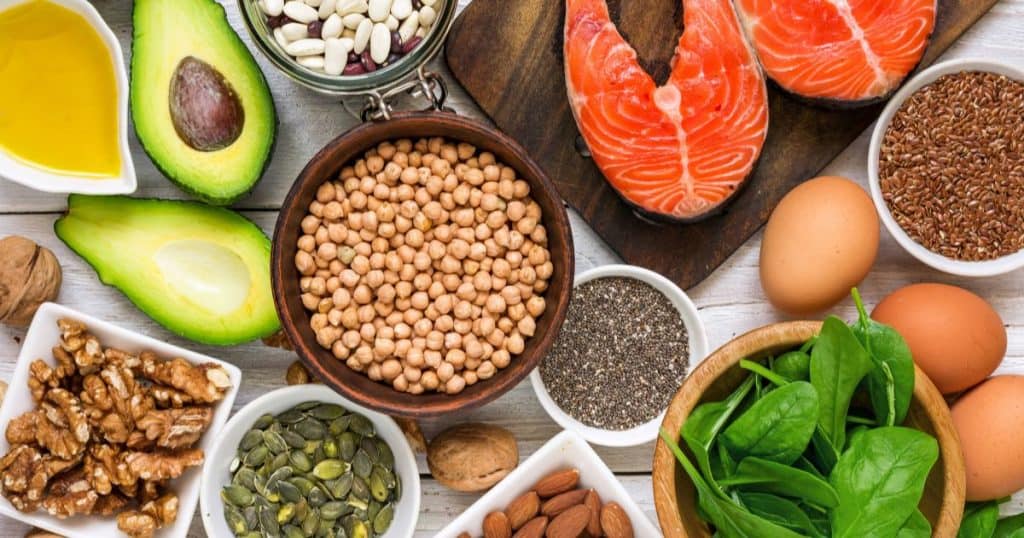
As a responsible pet owner, you want to make sure that your furry friend is getting all the necessary nutrients to stay healthy and happy. One essential nutrient that your dog needs is omega-3 fatty acids. These healthy fats are not only important for your dog’s overall health, but they can also help prevent and manage certain health conditions.
Omega-3 fatty acids are a type of polyunsaturated fat that your dog’s body cannot produce on its own. Therefore, it is essential to include them in your dog’s diet. The two main types of omega-3 fatty acids that are beneficial for dogs are eicosapentaenoic acid (EPA) and docosahexaenoic acid (DHA). EPA and DHA are found in fatty fish, fish oils, and algae.
Omega-3 fatty acids play an important role in your dog’s health. They are known to have anti-inflammatory properties, which can help reduce inflammation throughout your dog’s body. Inflammation can lead to a variety of health problems, including arthritis, allergies, and skin conditions. By reducing inflammation, omega-3 fatty acids can help prevent and manage these conditions.
In addition to reducing inflammation, omega-3 fatty acids can also help improve your dog’s skin and coat health. They can help reduce dryness, itching, and flakiness, and can also help reduce shedding. Omega-3 fatty acids can also help improve your dog’s heart health by reducing triglycerides, a type of fat found in the blood that can increase the risk of heart disease.
There are several ways to include omega-3 fatty acids in your dog’s diet. One way is to feed your dog fatty fish, such as salmon, mackerel, or sardines. You can also give your dog fish oil supplements, which are widely available at pet stores and online. Another option is to feed your dog a high-quality dog food that contains omega-3 fatty acids. Look for dog foods that contain fish oil or flaxseed oil, which are good sources of omega-3 fatty acids.
In conclusion, omega-3 fatty acids are an essential nutrient that your dog needs to stay healthy. They can help reduce inflammation, improve skin and coat health, and prevent and manage certain health conditions. By including omega-3 fatty acids in your dog’s diet, you can help ensure that your furry friend stays happy and healthy for years to come.
Understanding Your Dog’s Overall Health

As a pet owner, it’s essential to understand your dog’s overall health to ensure they live a long, happy life. A healthy dog is a happy dog, and it’s your responsibility to provide them with the necessary care to maintain their well-being.
Your dog’s overall health includes their physical, mental, and emotional state. Here are a few things you should consider to keep your furry friend in top shape:
Regular Check-Ups
Taking your dog to the veterinarian for regular check-ups is crucial to maintaining their overall health. During these visits, the vet will check your dog’s weight, heart rate, and temperature, among other things. Regular check-ups can help detect any health issues early on, making treatment easier and more effective.
Proper Nutrition
A healthy diet is essential for your dog’s overall health. Feeding your dog a balanced diet that meets their nutritional needs can help prevent obesity, dental problems, and other health issues. Consult with your veterinarian to determine the best diet for your dog based on their age, breed, and activity level.
Regular Exercise
Regular exercise is crucial for your dog’s physical and mental health. Exercise can help maintain a healthy weight, improve cardiovascular health, and reduce stress and anxiety. Make sure to provide your dog with enough exercise based on their breed and activity level.
Grooming
Grooming is essential for your dog’s physical and emotional well-being. Regular grooming can help prevent skin infections, matting, and other health issues. It’s also an excellent opportunity to bond with your furry friend.
Vaccinations
Vaccinations are crucial for preventing many diseases that can affect your dog’s overall health. Consult with your veterinarian to determine which vaccinations are necessary for your dog based on their age, breed, and lifestyle.
By understanding your dog’s overall health, you can provide them with the necessary care to maintain their well-being. Regular check-ups, proper nutrition, regular exercise, grooming, and vaccinations are essential for keeping your furry friend happy and healthy.
Nutritional Requirements of Dogs

As a responsible pet owner, it is important to ensure that your fluffy dog is receiving the proper nutrients to maintain a healthy and happy life. Dogs require a balanced diet that includes proteins, fats, carbohydrates, vitamins, minerals, and water to function properly.
Proteins
Proteins are essential for building and repairing tissues, as well as maintaining a healthy immune system. They are found in animal-based products such as meat, fish, and eggs. Plant-based sources of protein, such as soy and beans, can also be included in your dog’s diet.
Fats
Fats provide your dog with energy and help maintain healthy skin and coat. They are found in animal-based products such as meat and fish, as well as plant-based sources such as flaxseed and canola oil. It is important to ensure that your dog is receiving the proper balance of omega-3 and omega-6 fatty acids.
Carbohydrates
Carbohydrates provide your dog with energy and are found in grains, vegetables, and fruits. However, it is important to note that dogs do not require carbohydrates in their diet as they can produce glucose from protein and fats.
Vitamins and Minerals
Vitamins and minerals are essential for your dog’s overall health and well-being. They can be found in fruits, vegetables, and supplements. It is important to consult with your veterinarian to determine if your dog requires any additional supplements or vitamins.
Water
Water is essential for your dog’s health and survival. It helps regulate body temperature, aids in digestion, and transports nutrients throughout the body. Ensure that your dog has access to clean water at all times.
In conclusion, providing your fluffy dog with a balanced and nutritious diet is essential for their overall health and happiness. It is important to consult with your veterinarian to determine the specific nutritional requirements for your dog based on their age, breed, and health status.
The Role of Nutritionists in Dog Health

Nutritionists play a crucial role in ensuring the health and well-being of dogs. They are experts in animal nutrition and can help pet owners develop customized diet plans that meet their dog’s specific needs. Nutritionists can also provide advice on feeding schedules, portion sizes, and the types of food that are best suited for your dog’s breed, age, and activity level.
One of the primary responsibilities of a nutritionist is to ensure that your dog is receiving a balanced and complete diet. This means that their food contains all of the essential nutrients that they need to maintain optimal health, including proteins, carbohydrates, fats, vitamins, and minerals. A nutritionist can also help you identify any nutritional deficiencies that your dog may have and recommend supplements or changes to their diet to address these issues.
Another important role of a nutritionist is to help pet owners understand the impact that food has on their dog’s health. They can provide guidance on the types of food that are best suited for dogs with specific health conditions, such as diabetes, kidney disease, or food allergies. They can also help you understand the importance of portion control and the risks associated with overfeeding your dog.
In addition to providing nutritional advice, nutritionists can also help pet owners make informed decisions about commercial pet food. They can evaluate the quality and nutritional value of different brands and types of dog food and recommend products that are best suited for your dog’s needs. They can also help you understand the importance of reading labels and identifying potentially harmful ingredients.
Overall, nutritionists play a critical role in ensuring that dogs receive the proper nutrition they need to maintain optimal health. By working with a nutritionist, pet owners can develop customized diet plans that are tailored to their dog’s specific needs, ensuring that they receive the nutrients they need to thrive.
FAQs
What are the essential nutrients dogs need for a healthy diet?
Dogs require a balanced diet that includes protein, carbohydrates, fats, vitamins, and minerals. Protein is essential for building and repairing muscles, while carbohydrates provide energy. Fats are also important for energy and to support healthy skin and coat. Vitamins and minerals are necessary for overall health and to prevent deficiencies.
How can I ensure my dog is getting a balanced diet?
To ensure your dog is getting a balanced diet, you should feed them high-quality commercial dog food that meets their nutritional needs. Be sure to read the label and choose a food that has protein listed as the first ingredient. You can also supplement their diet with fresh vegetables and fruits, but be sure to avoid feeding them foods that are toxic to dogs, such as chocolate, grapes, and onions.
What are some common mistakes pet owners make when it comes to their dog’s diet?
One common mistake pet owners make is overfeeding their dogs, which can lead to obesity and other health problems. Another mistake is feeding their dogs table scraps, which can be high in fat and calories and can also cause digestive problems. It’s important to stick to a consistent feeding schedule and to only feed your dog foods that are safe and healthy for them.
What are some tips for maintaining a healthy weight for my dog?
To maintain a healthy weight for your dog, you should feed them a balanced diet and ensure they get regular exercise. Avoid overfeeding and limit treats to healthy options, such as small pieces of fresh vegetables or fruit. If your dog is overweight, consult with your veterinarian to develop a weight loss plan.
What are the benefits of homemade dog food?
How often should I take my dog to the vet for check-ups and vaccinations?
You should take your dog to the vet for regular check-ups at least once a year. Your vet can perform a physical exam and check for any health problems. They can also recommend a vaccination schedule to keep your dog protected from common diseases. If your dog has any health issues or concerns, you should schedule an appointment with your vet as soon as possible.
Remember to always consult with your veterinarian before making any changes to your dog’s diet or health routine. By providing your fluffy dog with a balanced diet and regular veterinary care, you can help ensure they live a happy and healthy life.




Leave a Reply
You must be logged in to post a comment.